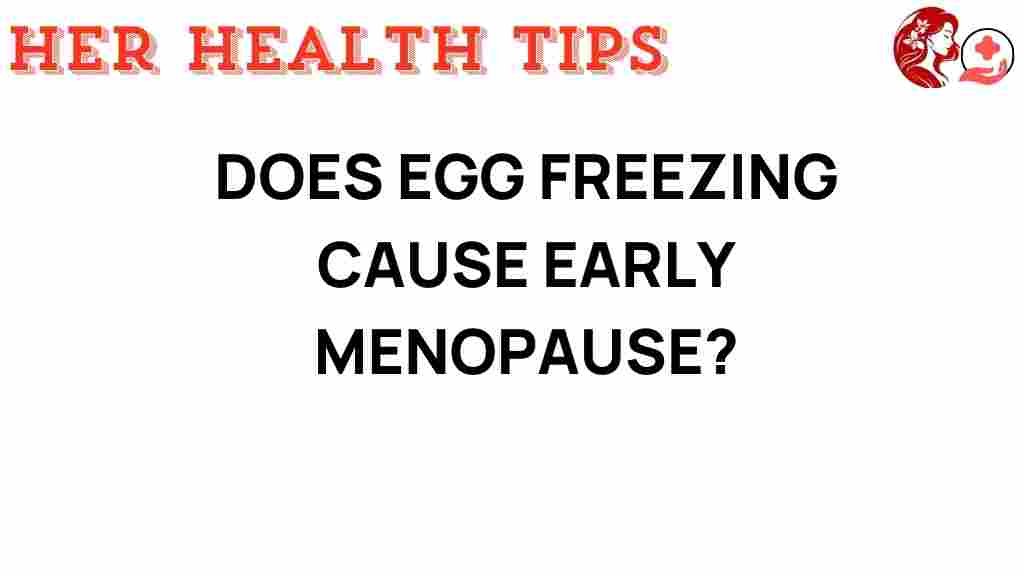Egg Freezing: A Hidden Risk of Early Menopause?
As women navigate their reproductive years, they often encounter decisions regarding family planning and fertility preservation. One option that has gained popularity is egg freezing, a process that allows women to store their eggs for later use. While this technique offers many benefits, it is crucial to examine potential risks, including its relationship with early menopause. In this article, we will explore egg freezing, its impact on reproductive health, and how it may relate to early menopause.
Understanding Egg Freezing
Egg freezing, or oocyte cryopreservation, is a medical procedure that involves retrieving eggs from a woman’s ovaries and freezing them for future use. This process allows women to delay childbearing while maintaining their fertility. As societal norms evolve, many women are choosing to focus on their careers, education, or personal development before starting a family, making egg freezing an attractive option.
The Process of Egg Freezing
Egg freezing involves several steps:
- Consultation: Women meet with a fertility specialist to discuss their reproductive health, reasons for egg freezing, and the procedure’s implications.
- Ovarian Stimulation: Hormonal medications are prescribed to stimulate the ovaries to produce multiple eggs in one cycle.
- Monitoring: Regular ultrasounds and blood tests are conducted to monitor the growth of the follicles (the sacs containing the eggs).
- Egg Retrieval: Once the eggs are ready, a minor surgical procedure is performed to retrieve them.
- Cryopreservation: The retrieved eggs are then frozen using advanced techniques to ensure their viability for future use.
Risks Associated with Egg Freezing
While egg freezing can be a valuable tool for many women, there are certain risks to consider. One significant concern is the possibility of an age-related decline in egg quality and ovarian reserve.
The Link Between Egg Freezing and Early Menopause
Research indicates that women who delay pregnancy until their late 30s or early 40s may face a higher risk of early menopause. This phenomenon can be attributed to several factors:
- Ovarian Reserve: Women are born with a finite number of eggs, and this number decreases with age. Freezing eggs later in life may not yield high-quality eggs.
- Hormonal Changes: As women age, hormonal fluctuations can affect ovulation and overall reproductive health.
- Emotional and Physical Stress: The process of egg freezing can be physically and emotionally taxing, which may influence hormonal balance.
Understanding Early Menopause
Early menopause is defined as the cessation of menstrual periods before the age of 45. This condition can lead to various health issues, including:
- Bone Health: Decreased estrogen levels can lead to osteoporosis.
- Cardiovascular Risks: Women experiencing early menopause may have a higher risk of heart disease.
- Mental Health: Hormonal changes can contribute to anxiety and depression.
Fertility Preservation and Women’s Health
Fertility preservation through egg freezing can be a proactive measure for women concerned about their reproductive health. However, it is essential to consider the long-term implications on fertility and overall health. Being aware of the potential risks associated with delayed childbearing is crucial.
Factors Influencing Egg Quality
Several factors can impact egg quality and overall fertility:
- Age: As women age, both the quantity and quality of their eggs decline.
- Lifestyle Choices: Smoking, excessive alcohol consumption, and poor diet can negatively affect reproductive health.
- Medical Conditions: Conditions such as polycystic ovary syndrome (PCOS) and endometriosis can impact fertility.
Step-by-Step Guide to Egg Freezing
If you are considering egg freezing, here’s a step-by-step guide:
- Research and Consultation: Start by researching fertility clinics and scheduling a consultation with a specialist.
- Health Assessment: Undergo necessary tests to assess your ovarian reserve and overall reproductive health.
- Start Ovarian Stimulation: Follow the prescribed hormonal regimen to stimulate egg production.
- Egg Retrieval: Attend the appointment for egg retrieval when your follicles are mature.
- Freezing and Storage: The clinic will freeze your eggs for future use.
Troubleshooting Tips
While the process of egg freezing is generally straightforward, complications can arise. Here are some troubleshooting tips:
- Consult Your Specialist: If you experience any discomfort or unusual symptoms during ovarian stimulation, reach out to your fertility specialist immediately.
- Monitor Your Health: Pay attention to your body and any emotional changes during the process. Seek support if needed.
- Stay Informed: Keep abreast of the latest research and findings related to fertility preservation and women’s health.
Conclusion
Egg freezing presents an opportunity for women to take control of their reproductive health and preserve fertility. However, understanding the potential risks, such as the connection between egg freezing and early menopause, is essential. By being informed about factors such as ovarian reserve, age-related decline, and egg quality, women can make educated decisions about their future.
For more information on reproductive health, you can visit the American College of Obstetricians and Gynecologists. Additionally, consider speaking with a healthcare professional specializing in women’s health to discuss your options and plan for the future.
This article is in the category Reproductive and created by HerHealthTips Team

1 thought on “Egg Freezing: A Hidden Risk of Early Menopause?”